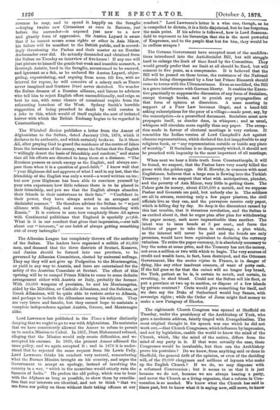The German Government have accepted most of the modifica- tions
introduced into the Anti-Socialist Bill, but will struggle hard to enlarge the limit of time fixed by the Committee. They would greatly prefer that no limit at all should be fixed, but will consent to five years, as a compromise. It is believed that the Bill will be passed on these terms, the resistance of the National Liberals being disorganised by a fear lest Prince Bismarck should come to terms with the Ultramontanes. Even as modified, the Bill is a grave interference with German liberty. It enables the Execu- tive practically to suppress the discussion_ of any form of Socialism, except through books, and to punish any propagandism of that form of opinion at discretion. A mass meeting in support of a Poor Law becomes illegal, and a hand-bill asking subscriptions for the poor of a village—made poor, say, by the conscription—is a proscribed document. Socialism must now propagate itself, as slander does, in whispers ; and as usual, whispers will circulate more rapidly than any paper. The excep- tion made in favour of electoral meetings is very curious. It resembles the Indian version of Lord Campbell's Act against obscene representations, which declared the Act inapplicable to any religious book, or " any representation outside or inside any place of worship." If Socialism is so dangerously wicked, it should not be preached with impunity in the most important of all meetings;


































 Previous page
Previous page